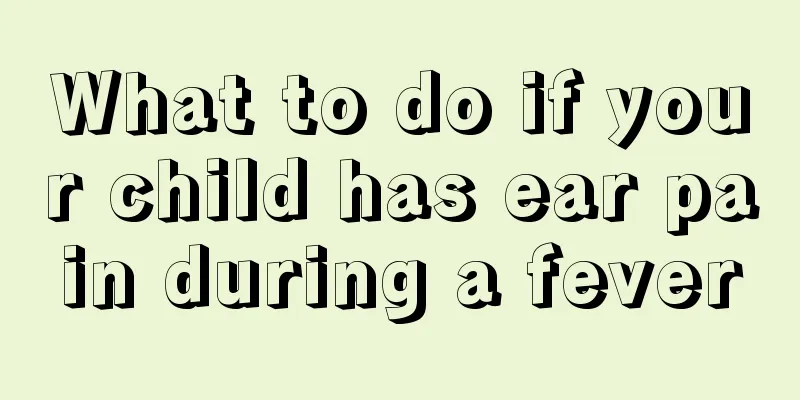Why is my five-month-old baby crying in the middle of the night?

|
We know that good sleep is directly related to the baby's growth and development. However, some babies always cry in the middle of the night for some reasons. This will not only affect the baby's healthy growth, but also the parents who have to take care of the baby will become particularly tired. There are many reasons for the baby's crying. Only by finding the reason can we mediate in time. Let's understand why a five-month-old baby cries in the middle of the night. Why is my five-month-old baby crying in the middle of the night? 1. Hunger and thirst Hunger and thirst are the most common reasons for babies crying, which are more common in babies under 3 months old. This is due to insufficient breast milk, too dilute milk powder, or not eating enough at the last meal for some reason. The ambient temperature is too high, the baby sweats a lot, and the baby cries incessantly due to thirst. 2. Cold, hot, wet, itchy, painful An environment that is too cold or too hot can cause discomfort to babies, but overheating is more likely to cause crying and restlessness than overcooling. The diaper is wet (due to defecation or urine) and is not changed in time, and the baby expresses this to the parents by crying. Babies cry and make a fuss due to itching caused by eczema, excessive sweating, unclean skin, etc., or due to pinworms crawling around the anus and causing severe itching. 3. Feeling of urination After training, babies will cry to ask their mothers for help in urinating or defecating. 4. Irregular life Babies under 6 months old often have their day and night reversed, sleeping during the day and crying at night. These babies are commonly known as "night cryers". "Pathological" crying is caused by a disease, and is common in the following situations: 1. Oral ulcers Often cries while feeding or eating. 2. Abdominal pain Such as intussusception (manifested by paroxysmal severe crying, accompanied by pale face, vomiting, and jam-like stools), acute appendicitis (persistent crying and fever, and crying worsens once the appendix is perforated), incarcerated inguinal hernia (severe abdominal pain, the child often touches the incarcerated area with his hands and vomits), intestinal spasm (crying in waves, and crying again due to intestinal spasm after a period of quietness), etc. 3. Nasal congestion He cries while feeding because of nasal congestion that affects his breathing. 4. Headache Headaches caused by various reasons can make babies cry, such as fever, meningitis, which may cause bursts of shrill crying. 5. Otitis externa, furunculosis The baby cries more loudly when the affected ear is placed close to the mother's body or when the affected ear is pulled during feeding. Generally speaking, babies who cry "physiologically" are in good condition, have normal diet, loud cries, and have normal complexion and spirits in between crying. The crying stops when the cause is eliminated. The crying of "pathological" crying babies is unusual, sometimes screaming, hoarse, and often sudden and violent crying; accompanied by fever, lethargy, pale complexion, and sometimes vomiting, diarrhea, and blood in the stool. It is necessary to go to the hospital for further investigation of the cause. Sometimes babies cry for no reason. Many babies have fussy episodes every day, often at the same time. Some babies are fussy most of the time. The reason for their fussiness is not hunger, but you don’t know why. Even feeding doesn’t help. Try wrapping him in a thin blanket, or change his position, walk him, or rock him. In short, remember that no matter what the reason for the baby’s fussiness is, he just needs you to hold him. The above is an introduction to why a five-month-old baby cries in the middle of the night. After understanding it, we know that there are many reasons why babies cry during this period, such as being hungry or feeling unwell. Such symptoms may occur, so parents should find the reasons and make timely adjustments. In addition, when taking care of the baby, you must observe carefully and seek medical attention in time if any abnormal situation occurs. |
<<: Why is my seven-month-old baby's stool green?
>>: What to do if your baby spits up breast milk
Recommend
How many months does the baby change the pacifier
The pacifier is the thing that babies touch most ...
Neonatal jaundice12
Jaundice is a relatively common disease that peop...
1 year old baby diarrhea
Diarrhea is a very common symptom. For adults, se...
What are the treatments for stuttering?
Many parents are shocked and nervous when they fi...
What causes seizures in children?
Children's body functions are relatively frag...
Symptoms and treatment suggestions for three-month-old babies with colds
A cold is a disease that can be serious or minor....
Why does my child have stomachache after eating?
As parents, our children's health is our bigg...
Why does a child’s stool turn black? Reasons for black stool in children
The normal stool color of a baby should be yellow...
What is the best food for children to stimulate their appetite?
Many children have a problem of being picky eater...
Tips for feeding medicine to babies
It is easy for babies to take medicine when they ...
Baby's favorite nutritious recipes
We all know that babies need nutrition when they ...
Symptoms of finger deformities in newborns
Regarding the issue of newborn finger deformities...
What are the symptoms of myocarditis in children?
Almost all adults know that heart disease is a ve...
Why does the cough get worse after pediatric massage?
Pediatric massage is being used more and more in ...
How to educate children who take other people's things
For parents, the education of children is the mos...









